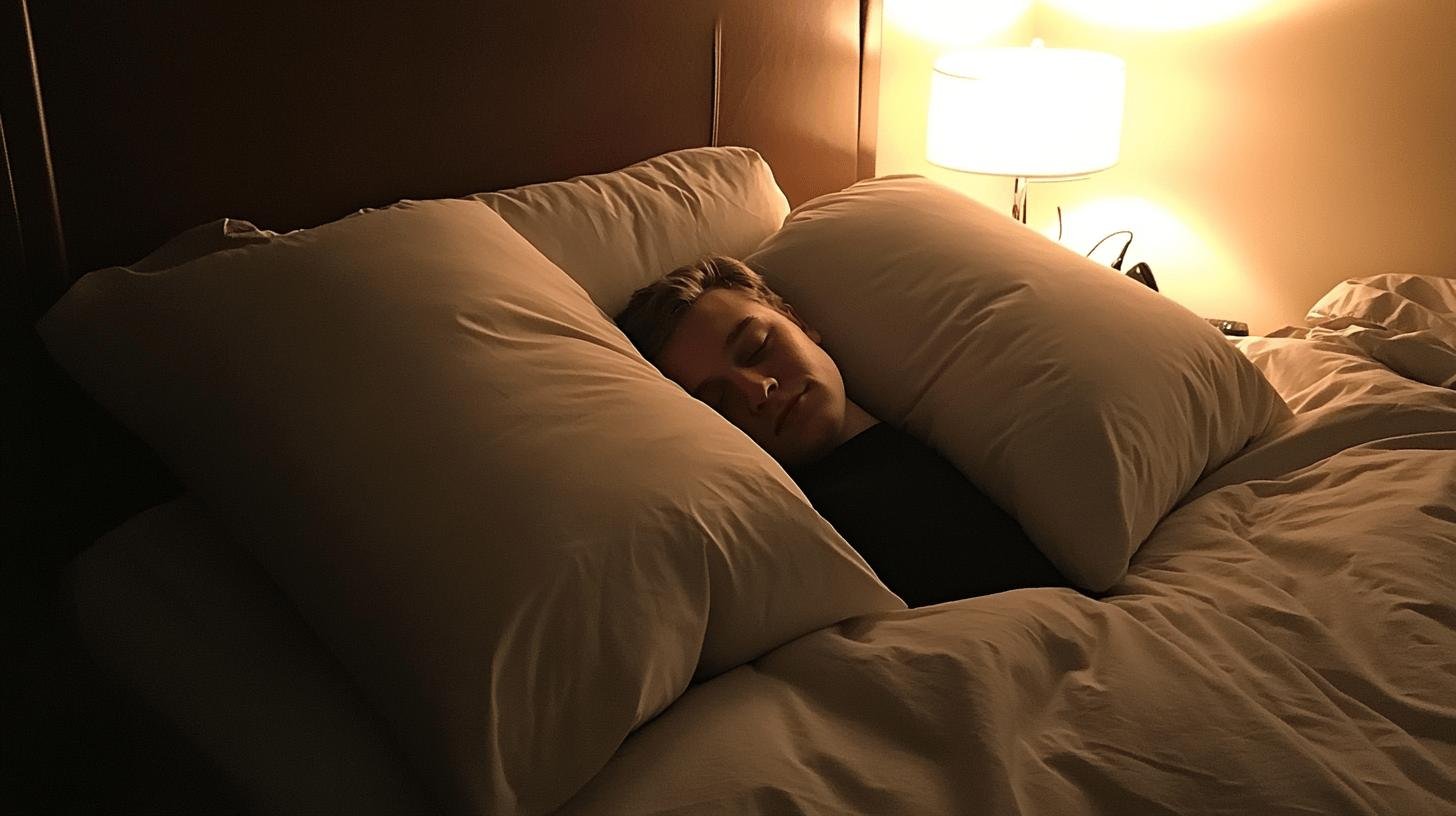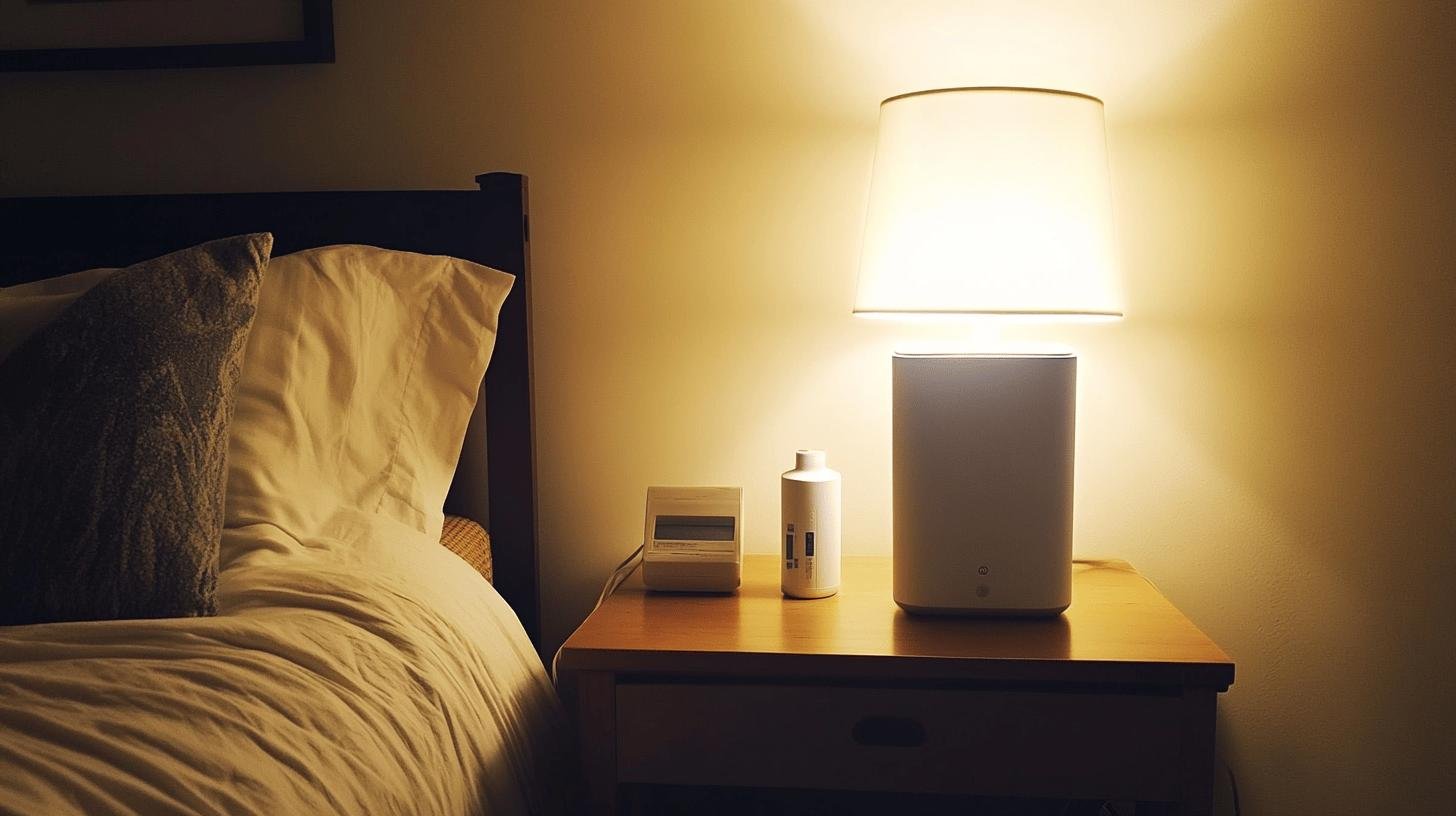TL;DR:
- Common nighttime asthma triggers: dust mites, pet dander, mould, indoor air pollution, cooler air, strong odours, and chemical fumes.
- Poor sleeping positions worsen symptoms: lying flat increases airway pressure; side-sleeping or elevating the head is better.
- Hormonal changes at night reduce epinephrine (airway opener) and increase histamine (tightener).
- Strategies for management: use air purifiers, clean regularly, ensure bedding hygiene, and keep pets out.
- Nocturnal asthma affects up to 75% of sufferers; management includes regular medication and lifestyle adjustments.
- Work with healthcare providers for personalized treatment plans to effectively control symptoms.
Do you wonder why asthma attacks like to crash your slumber party and what triggers asthma attacks at night? Well, you’re not alone. Many folks with asthma find themselves gasping for air when they should be counting sheep. It’s not just about allergies—think about dust mites, pet dander, and even the cool air! All these sneaky triggers lurk in our bedrooms and team up to mess with our airways as we snooze. But fear not! Uncovering the culprits behind these nighttime disturbances can be a game-changer for restful, healthy nights—no inhaler needed. Ready to breathe easy? Let’s dive in!
Common Triggers of Asthma Attacks at Night
Have you ever wondered why your asthma worsens at night? It’s all about sneaky allergens like dust mites and pet dander hiding in your bedroom. Dust mites are tiny creatures that thrive in bedding and carpets, making them a prime suspect for triggering asthma attacks. Pet dander, which consists of tiny skin flakes, can also cause havoc for asthma sufferers. Let’s not forget mould, which thrives in damp areas like bathrooms and can quickly spread to your sleeping space. These nighttime allergens can increase asthma symptoms, leaving you gasping for breath during the night.
Now, let’s explore other common triggers that might make your nights difficult:
- Indoor air pollution
- Cooler air
- Mould presence
- Strong odors
- Chemical fumes
So, why do these factors worsen asthma at night? Cooler air can cause your airways to tighten, making breathing more difficult. Indoor air pollution from smoke and chemical fumes adds to the struggle, irritating your lungs further. Combined, these factors create a perfect storm for nighttime asthma attacks. This can leave you tossing and turning instead of getting much-needed rest. Keeping your bedroom allergen-free and at a comfortable temperature may be your ticket to a good night’s sleep.
How Sleeping Positions Affect Nighttime Asthma

Do you find your asthma flares up when you go to bed? You’re not alone! Sleeping positions can greatly affect how your asthma behaves at night. Lying flat on your back might increase pressure on your lungs and airways, making breathing harder. If you sleep on your stomach, it could be even worse. How you position yourself can either help you breathe easier or leave you gasping for air.
What’s a better sleeping position to avoid asthma symptoms? Consider these tips:
- Elevate head with pillows
- Sleep on your back
- Avoid lying flat
- Consider side-sleeping
Adjusting your sleeping position can be a game-changer. By elevating your head with pillows, you can ease pressure on your airways, reducing asthma symptoms that may wake you up. Sleeping on your back with some support can keep your airways open, and side-sleeping can be beneficial, too. This simple change can help you avoid nightly asthma struggles, leading to more restful sleep.
The Role of Hormones and Cooler Air in Nighttime Asthma
Ever wonder why your asthma crashes your sleep party? Hormones might be the uninvited guests causing trouble. During the night, hormonal changes significantly affect asthma severity. Here’s the scoop: as you sleep, your body produces less epinephrine, a hormone that usually helps keep airways open. At the same time, histamine levels rise, tightening your airways and making breathing more challenging. This hormonal rollercoaster can worsen asthma symptoms, so if you find yourself wheezing more at night, blame those pesky hormones!
Now, let’s talk about cooler air and its effect on asthma. When temperatures drop, your airways may constrict at night, making breathing harder. This is especially true if your bedroom is on the cooler side. But there’s a fix! Keeping your room at a cosy temperature can prevent airway constriction. Grab a blanket, crank up the heat a bit, and keep that air nice and toasty to breathe easier through the night.
Managing Asthma Attacks at Night: Tips and Strategies

Are you struggling with nighttime asthma? Let’s tackle it with smart strategies! Firstly, keeping your sleeping space clean can be a game-changer. Using air purifiers filters out pesky allergens, while regular cleaning keeps dust mites and pet dander at bay. It’s like giving your bedroom a fresh breath of air! Don’t underestimate a clutter-free, allergen-free environment for a peaceful sleep.
Here’s a handy table with effective strategies:
| Strategy | Description |
|—————–|————————————————-|
| Air Purifiers | Filter allergens, improving bedroom air quality.|
| Regular Cleaning| Dust and vacuum weekly to reduce allergens. |
| Bedding Hygiene | Wash sheets in hot water and use dust-proof covers.|
| Allergen-Free Zone| Keep pets out of the bedroom to reduce dander exposure.|
Taking medications as prescribed is another key piece of the puzzle. Before sleeping, ensure you’re using your inhaler or prescribed asthma meds. This can help prevent nighttime attacks. But don’t just wing it—consult a healthcare professional to tailor a plan. They can help determine the best medication timing and combination to keep you breathing easily all night.
Understanding Nocturnal Asthma and Its Treatment Options
Have you experienced asthma symptoms sneaking up just as you try to rest? That’s the tricky nature of nocturnal asthma. It’s a type of asthma that worsens at night, affecting up to 75% of sufferers. You might find yourself wheezing, coughing, or feeling chest tightness when you should be sleeping. This nighttime trouble isn’t limited to one kind of asthma—it can impact allergic, non-allergic, and exercise-induced asthma. The exact reason nighttime is a hotspot isn’t clear, but cooler air, allergens, and hormonal changes are often culprits.
So, what can be done about these symptoms? While there’s no cure for asthma, daily management can make a difference. Regular use of asthma medications, like inhaled steroids, helps keep symptoms at bay. These meds reduce inflammation in the airways, aiding easier breathing. Long-acting inhalers with bronchodilators provide extended relief through the night. Medications alone aren’t enough, though. Lifestyle adjustments, like keeping your sleeping area free of allergens, can also help manage nighttime asthma.
But here’s the kicker: not everyone responds to treatments similarly. That’s where a personalized treatment plan comes in. You can craft a tailored plan by working with a GP or asthma nurse. This might include adjusting medication doses or integrating new strategies. By understanding your unique triggers and symptoms, healthcare providers can help ensure you’re not just surviving the night but thriving, with fewer interruptions for better sleep quality.
Final Words
Picture all those sneaky triggers like dust mites and pet dander making their way into your bedroom and teaming up with cooler air and strong odours to mess with your night’s rest.
Adjusting sleep positions and managing room temperature can complement your asthma plan. With the right strategies and a bit of inside know-how, managing what triggers asthma attacks at night becomes a piece of cake.
Team up with your doctor, try out some handy tricks, and you’re one step closer to a better night’s sleep.
FAQ
How to calm an asthma cough at night?
You can calm an asthma cough at night by keeping your bedroom allergen-free, using a humidifier, and sleeping with your head elevated. Taking prescribed medication before bed also helps.
Can you die from an asthma attack in your sleep?
Yes, while rare, severe asthma attacks can be life-threatening, even during sleep. Following your asthma management plan and seeking emergency help if symptoms worsen is crucial.
How to prevent asthma attacks at night?
Prevent nighttime asthma attacks by cleaning your bedroom, using air purifiers, and avoiding allergens. Regularly take prescribed medications and consult with a healthcare provider for tailored strategies.
Why is asthma worse at night and in the morning?
Asthma worsens at night and in the morning due to cooler air, increased exposure to indoor allergens, and hormonal changes that affect airways. Keep the temperature comfortable and control allergens to minimize symptoms.
How to stop an asthma cough at night without an inhaler?
Try elevating your head while sleeping, using a humidifier, and avoiding allergens in your bedroom. Keeping well-hydrated can sometimes ease an asthma cough.
Is nocturnal asthma dangerous?
Nocturnal asthma can be dangerous if not managed properly. It disrupts sleep and can lead to severe asthma attacks. Effective management and medication use are essential to reduce risks.
Why does asthma flare up at night?
Asthma flares up at night due to allergens, cooler air, and hormonal fluctuations. These factors increase airway sensitivity, making breathing more challenging. Mitigating allergens and controlling room climate can help.
How can I calm my asthma at night?
To calm asthma at night, maintain a clean sleep environment, use air purifiers, and elevate your head during sleep. Also, consistently use prescribed asthma medications for effective symptom control.
How do you calm down an asthma attack?
Calm an asthma attack immediately by using a rescue inhaler, sitting upright to aid breathing, and practising slow, deep breaths. If symptoms persist, seek emergency medical help.
What drink is good for asthma?
Warm water or herbal teas can soothe asthma. Staying hydrated may help keep airways moist, although sticking to your prescribed asthma treatment plan is vital.

